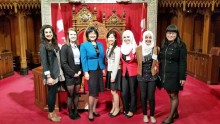by Anah Mirza, Munk One 2013-2014
A recent U of T News article covering Women In House paints me out to be quite the political fan girl – which is entirely the case. The two-day trip to Ottawa only furthered my passion for achieving fair representation in government. The program consists of a shadowing experience, where participants are matched to female MPs and Senators, with whom they share a day atop the Hill.
My host, Senator Ataullahjan (Ontario – Toronto) was an absolute pleasure. In the Senate, she sits on the Foreign Affairs and Human Rights Committees, deputy chairing the latter. Both fields are of great interest to me, and learning of her work in sponsoring various studies was reflective of the product that emerges from the Red Chamber.
Senator Ataullahjan is also of a visible minority and spoke of the barriers to entry that she’d experienced firsthand. We weren’t the only ones asking questions, however: the Senator inquired about how the diversity scene pans out on Canadian campuses. Politicians are often painted with a scandal-laden brush, and limited scopes are often utilized by the media. Women In House did not present me with a narrative; instead, what I observed were revelations.
Networking with so many Senators and MPs meant discovering a variety of pathways to Parliament Hill. Some found themselves in politics accidentally, while others had been chipping away at House-involved issues for the entirety of their careers. The common denominator is that each had encountered something problematic at some point in her life, and sought to amend it. That sounds familiar...
The priority that Munk One placed on asking better questions is a skill I’ve become a heavy proponent of. Transparency is absolutely essential to functioning liberal democracies, and can only be achieved when we hold our governments accountable. I found myself inquiring about specific processes as opposed to the scandals that the media so enjoys covering. Learning to look past bias was also a major takeaway from first year; reading lengthy datasets and reports in fields that I was relatively unfamiliar with made critically reading transcriptions of parliamentary proceedings a breeze. Policy analyses always engaged me, but having first explored the societal impacts the pursuit of passing a Bill can have during Munk One, creating such solutions seems less out of reach.
What resulted was a whirlwind day full of questions, answers and a refreshed outlook on the aim that is gender equity as its challengers manifest in a first world country. To recall one of my favourite discussions from last year – wicked problem, much?
